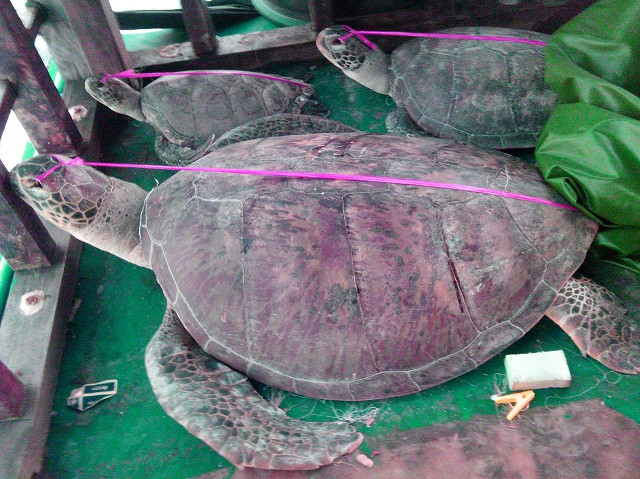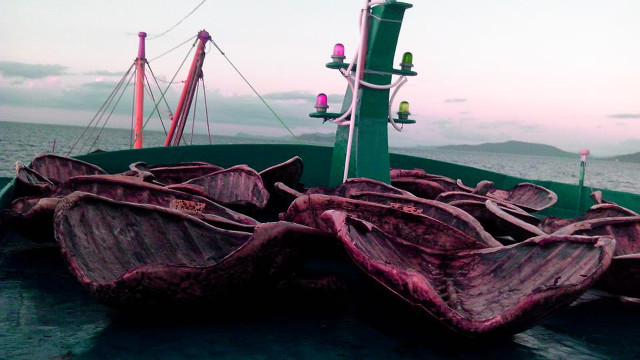SUMMARY
This is AI generated summarization, which may have errors. For context, always refer to the full article.

MANILA, Philippines (2nd UPDATE) – Philippine government agencies have filed complaints of environmental crime against the 9 Chinese fishermen arrested off the coast of Palawan on Tuesday, May 6.
The fishermen were found with about 500 live and dead turtles in their boat when they were intercepted by the Philippine National Police (PNP) Maritime Group on Hasa-Hasa Shoal (Half Moon Shoal), 60 nautical miles from Palawan.
“The complaint was filed by the PNP Maritime Group last Friday (May 9),” Department of Environment and Natural Resources Biodiversity Management Bureau (DENR-BMB) chief Theresa Mundita Lim told Rappler on Monday, May 12.
The fishermen now face charges for the violation of the Philippine Wildlife Act and Philippine Fisheries Code.
The complaint was built up jointly by the PNP, DENR BMB, Palawan Council for Sustainable Development (PCSD), a multisectoral body that decides on environmental issues in Palawan, and the Bureau of Fisheries and Aquatic Resources (BFAR).
There were a total of 11 Chinese fishermen arrested aboard their 15-tonne vessel but two of them were found to be minors and will be repatriated without charges, Prosecutor Allan Ross Rodriguez told Agence France-Presse.
Watch this report below.
Beyond apprehension
Under the Wildlife Act, the Chinese fishermen may face up to 12 years in prison or a fine of P1 million each (USD$22,600), said Lim.
“It should go beyond apprehension. There must be filing of charges and convictions so we can prevent this from happening again,” she added.

Lim said the DENR-BMB had yet to make an inventory of the turtles at the time of the interview with Rappler, and cannot say how many of the turtles are still alive.
The PNP Maritime Group had earlier said that the 11 Chinese fishermen, along with 5 Filipinos manning another seized boat in the same area, had been brought to the PNP’s Special Boat Units headquarters in Puerto Princesa, Palawan at around 4 am on Thursday, May 8.
Lim says the turtles found in the Chinese boat are likely to be Philippine sea turtles, popularly known as pawikan, an endangered animal protected by local and international wildlife conservation laws.
Taking an inventory would give valuable insight into the alleged poaching.
For instance, if the sea turtles are female, it would mean poachers hunted them on the beach since “only females go up to the beach in order to lay eggs,” explained Lim.
If the turtles are male and juvenile, the poachers likely dove into the sea to catch them.
Impact of poaching
Finding out the animals’ gender would also give a bigger picture of the impact of the crime.
“Catching females would impact greatly on the population. The survival rate of hatchlings is already so low. Poaching threatens them even more,” said Lim.
Sea turtles are in great demand in China, Hong Kong Taiwan and Japan for their meat and shells often used for jewelry.
Once an inventory of the turtles is completed, the DENR regional office in Palawan will tag the healthy turtles before releasing them back into the wild. Sick or injured turtles will be rehabilitated in Palawan.
The DENR will conduct a necropsy on the dead turtles and get a DNA sample. The results can be used to build up the case against the Chinese fishermen.
The planned filing of charges is expected to draw another howl from China, which had already deemed the arrest as a “premeditated provocative act” deliberately done by Philippine authorities to create more tension in the West Philippine Sea (South China Sea).
China claims that Hasa-Hasa Shoal, which it calls Banyue Reef, is part of its territory.
Philippine officials maintained, however, that the arrest was made in the performance of the duty of the maritime police patroling the area.
The PNP had even said that its “slow” patrol boat only managed to intercept the Chinese vessel and a local boat – out of several others found in the area – as these two had mechanical trouble and could not flee with the rest.
“What we did is not a provocative action (but) based on international law. Chinese fishermen violated our maritime laws,” Foreign Affairs Spokesman Charles Jose said in an interview with ANC on Thursday.
The Department of Foreign Affairs had given its assurance that concerned authorities in Palawan will address the case “in a just, humane and expeditious manner.” – Rappler.com
Add a comment
How does this make you feel?
There are no comments yet. Add your comment to start the conversation.